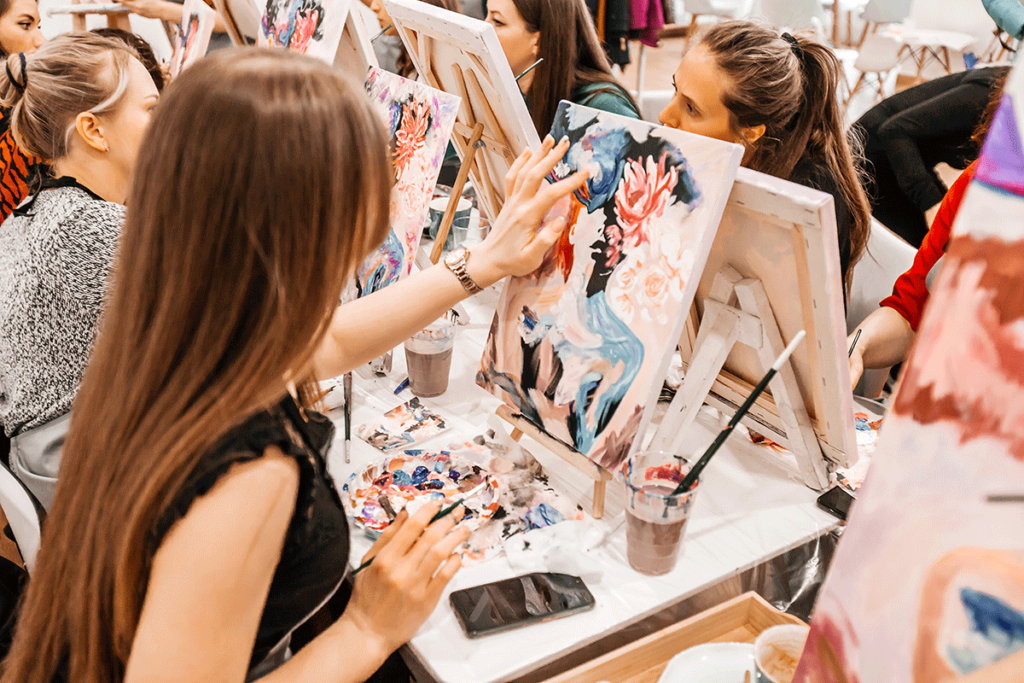For those struggling with substance use disorders, each person’s path to addiction is unique. Therefore, each person’s treatment journey should be unique, utilizing a variety of therapies tailored to their treatment needs and recovery goals. In addition to traditional therapies, behavioral and experiential therapies are being integrated more and more into the treatment experience. Art therapy for addiction is one of the experiential therapies that has been found to be highly beneficial in enhancing the treatment experience. Other experiential therapies include yoga, massage, and equine therapy.
If you are curious about how art therapy programs and other experiential therapies work in addiction recovery, call The Arbor today at 844.413.2690 to learn more.
Art Therapy Benefits
You may not have considered art therapy as a way to treat addiction, and you may be wondering how it can help someone struggling with a substance use disorder. Anyone can participate and benefit from art therapy.
The benefits of art therapy are:
- Feeling good about oneself – Self-esteem can take a hit when battling a substance use disorder. Being able to create and share with others in an artistic accomplishment as part of a social setting has a lot of benefits.
- Self-expression – Communicating how you feel is not always easy, especially when it comes to addiction. Traditional talk therapy sessions may not be where you feel most comfortable sharing, but experiential therapy, like art, could be where you express your emotions more clearly.
- Stress relief– Redirecting negative thoughts that trigger substance use is another benefit of art therapy. Working on an artistic endeavor also gives clients something more positive to focus on.
- Depression management – Coping techniques learned through art therapy will help to better manage symptoms of depression.
- Continuing education – For many, art therapy will be a new skill they learn. Still, for others, they may rediscover a hidden talent that helps them work through difficult feelings and emotions.
Art therapy can take the form of one-on-one sessions or group sessions. Group sessions can involve collaborative projects or individual art in a group setting.
Addiction Treatment Using Experiential Therapies
Experiential therapies round out a holistic treatment experience that also includes traditional talk therapies and behavior therapies. In the case of art therapy, you do not need to be a proven artist to take part in the therapy and see the therapeutic benefits of self-expression. Art therapy can actually bring out creativity that people did not even realize they had. In addition, experiential therapies can relieve stress and help clients refocus their energy on something productive instead of turning to drugs and alcohol.
Types of experiential therapies include:
- Equine therapy
- Art therapy
- Music therapy
- Yoga
- Outdoor activities like fishing and swimming
- Disc golf
Experiential therapies work well alongside behavioral therapies like cognitive-behavioral therapy (CBT), dialectical behavior therapy (DBT), and eye movement desensitization and reprocessing (EMDR).
Enroll in Art Therapy for Addiction at The Arbor
Art therapy has been proven to be a great outlet to refocus one’s energy and act as a coping mechanism when going through treatment for a substance use disorder. It’s a healthier way to express oneself and deal with emotions versus turning to drugs or alcohol.
Some people find nonverbal expression easier than sharing their feelings in a traditional talk therapy session. Learning to engage in experiential therapies in a safe and supportive therapeutic environment will set clients up for a successful recovery experience. Having an outlet to occupy one’s newly sober lifestyle will be a helpful tool in managing sobriety for the long haul.
The Arbor offers a variety of treatment options, so call the team today at 844.413.2690 or reach out online to get started on your sobriety journey.

